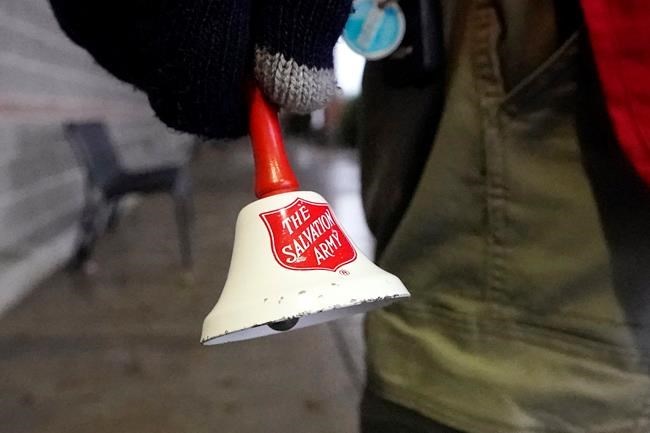
A Salvation Army bell is rung by Michael Cronin as he staffs the charity's red donation kettle in front of a grocery store, Tuesday, Dec. 8, 2020, in Lynden, Wash. The familiar ringing of handbells has gone silent at many Canadian shopping malls this year as the Salvation Army tries to cope with COVID-19 rules at a time of dropping donations.THE CANADIAN PRESS/AP/Elaine Thompson
December 19, 2020 - 7:00 AM
CALGARY - The familiar ringing of handbells has gone silent at many Canadian shopping malls this year as the Salvation Army tries to cope with COVID-19 rules at a time of dropping donations.
The Christmas Kettle campaign has been replaced with a red-and-white sign and an electronic tap pad that allows people in Alberta, parts of Ontario and Manitoba to donate $5 using debit or credit cards.
"This is our 118th year of having kettles and this is the first time we've ever had the kettles without people at them," said Maj. Al Hoeft, the Salvation Army's division secretary.
"Hopefully next year we'll be able to welcome all our volunteers back and get them out in the malls and the stores collecting again. But for 2020, this is a COVID-safe Christmas."
Some 1,000 volunteers in Alberta were sent home after high case numbers led the government to tighten restrictions on gatherings and retail businesses last week. And ready cash for many people no longer working has dried up, so reaching donation targets is challenging.
Hoeft said the annual campaign was slated to bring in $23 million, but is off to a slow start.
"We've been planning since May and June, recognizing that the economy was taking a real hit, realizing that meant our donors would have financial challenges as well as those that we serve," he said.
"It's a two-edged sword."
The head of Ronald McDonald House Charities Canada said the organization, which operates 17 facilities across Canada, is struggling with fundraising as well.
"Things are tough. We're all leaning in and trying to figure out how to continue to deliver our mission in a world that's changed," said CEO Cathy Loblaw.
"Sixty-nine per cent of charities are seeing a decline on average of 30 per cent. We've seen a decline of up to 60 per cent in some of our regions and, meanwhile, our costs are going up."
Ronald McDonald houses provide communal living for families from out of town who have sick children in hospital. Loblaw said retrofits may be needed in some locations to make them compliant with COVID-19 rules.
Existing services will continue, but may require dipping into a fund set aside for future expansion, she said.
"Today we serve just over 26,000 families a year. We are turning away over 3,000 families every year and we are nowhere near to meeting the demand for support that families need."
This is normally the busiest time of year for fundraising at the Calgary Women's Emergency Shelter, which is looking at different ways to raise money.
"We're not able to have special in-person events so everyone gets to be much more creative ... and we're finding a lot of people are using online donation platforms," explained volunteer fundraiser Bernadette Geronazzo.
"Demand is on the rise. We know at one point the calls to the crisis line at the Calgary Women's Emergency Shelter increased by 95 per cent."
The Calgary Food Bank is one of the few charities with positive news. Its giant warehouse is full to the ceiling. Volunteers have been busy making hampers with a steady supply of food moving down a conveyor belt.
The warehouse contains 450,000 kilograms of food, or about a three-week supply.
"We are not having problems keeping up with demand, fortunately," said president and CEO James McAra.
"When people call us and when our partnering agencies call us to say they know of a family that needs food, we're right on top of it."
McAra said demand went down at the start of the pandemic as people stayed home and received government assistance. But recently there has been an increase in new clients each week.
He said Canada's food banks hold a conference call every couple of weeks and most are in the same boat. There is some sharing of resources if regions find themselves short.
It's the future that remains a concern, he said.
"There's just so many things we don't know. We don't know what's going to happen three months from now. We don't know how the economy will react."
This report by The Canadian Press was first published Dec. 19, 2020
— Follow @BillGraveland on Twitter
News from © The Canadian Press, 2020